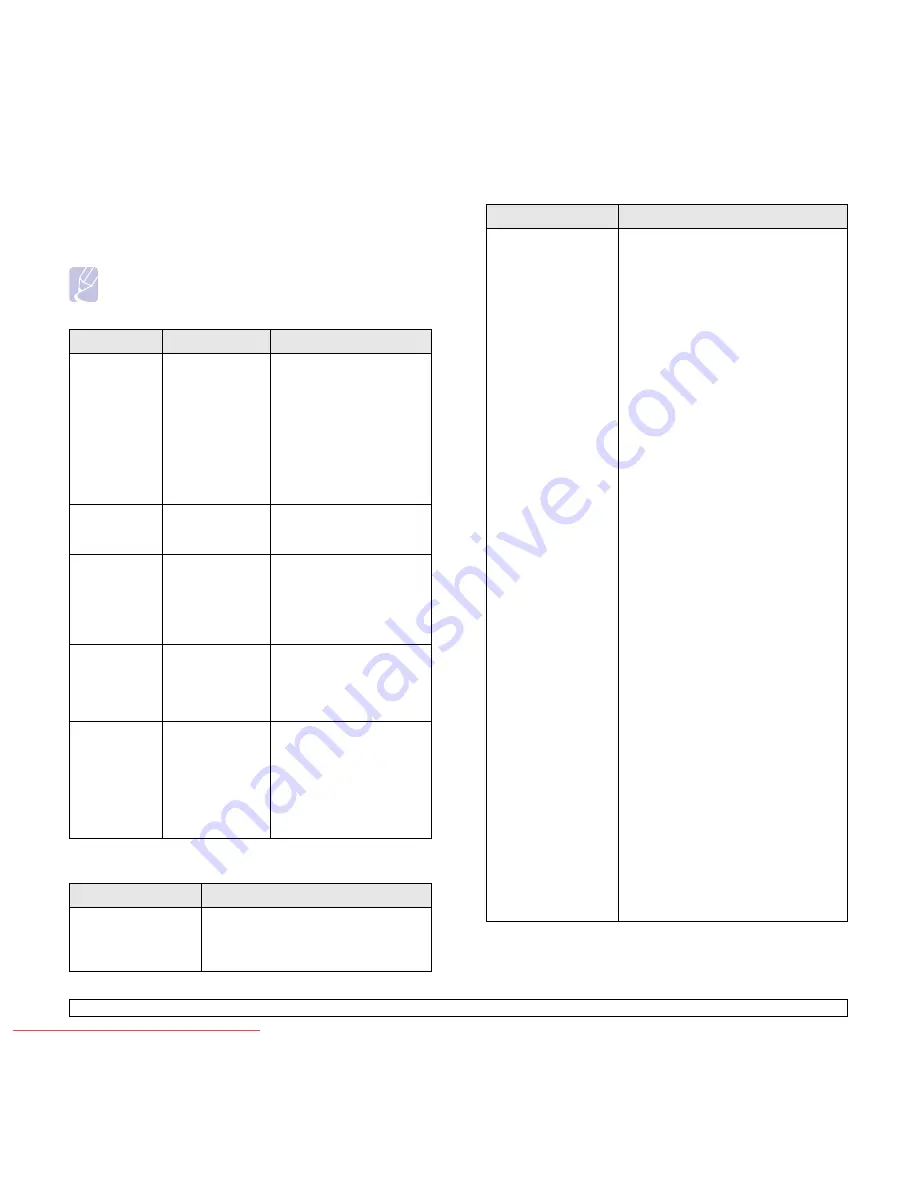
11
.21
<Troubleshooting>
Common PostScript problems
The following situations are PS language specific and may occur when
several printer languages are being used.
Note
To receive a printed or screen-displayed message when
PostScript errors occur, open the Print Options window and click
the desired selection next to the PostScript errors section.
Common Linux problems
Problem
Possible Cause
Solution
PostScript file
cannot be
printed.
The PostScript
driver may not be
installed correctly.
• Install the PostScript
driver, referring to
Software section
.
• Print a configuration page
and verify that the PS
version is available for
printing.
• If the problem persists,
contact a service
representative.
“Limit Check
Error” message
appears.
The print job was
too complex.
You might need to reduce
the complexity of the page or
install more memory.
A PostScript
error page
prints.
The print job may
not be PostScript.
Make sure that the print job
is a PostScript job. Check to
see whether the software
application expected a setup
or PostScript header file to
be sent to the machine.
The optional
tray is not
selected in the
driver.
The printer driver
has not been
configured to
recognize the
optional tray.
Open the PostScript driver
properties, select the
Device
Settings
tab, and set the
Tray
option of the
Installable
Options
section to
Installed
.
When printing
a document in
Macintosh with
Acrobat
Reader 6.0 or
higher, colors
print
incorrectly.
The resolution
setting in the
printer driver may
not be matched
with the one in
Acrobat Reader.
Make sure that the resolution
setting in your printer driver
matches the one in Acrobat
Reader.
Problem
Possible Cause and Solution
The machine does not
print.
The CUPS (Common Unix Printing
System) version distributed with SuSE
Linux 9.2 (cups-1.1.21) has a problem with
ipp (Internet Printing Protocol) printing.
The machine does not
print.
• Check if the printer driver is installed in
your system. Open the Unified Driver
configuration tool and switch to the
Printers tab in the Printers configuration
window to look at the list of available
printers. Make sure that your machine is
displayed on the list. If not, use the Add
new printer wizard to set up your device.
• Check if the printer has started. Open
Printers configuration and select your
machine on the printers list. Look at the
description in the Selected printer pane.
If its status contains “(stopped)” string,
please, press the
Start
button. After that,
normal operation of the printer should be
restored. The “stopped” status might be
activated when some problems in
printing occurred. For instance, this
could be an attempt to print documents
when the port is claimed by a scanning
application.
• Check if the port is not busy. Since
functional components of MFP (printer
and scanner) share the same I/O
interface (port), the situation of
simultaneous access for different
“consumer” application to the same port
is possible. To avoid possible conflicts,
only one of them is allowed to gain
control over the device at a time. The
other “consumer” will encounter “device
busy” response. You should open the
ports configuration and select the port
assigned to your printer. In the Selected
port pane you can see if the port is
occupied by some other application. If
this is the case, you should wait for
completion of the current job or you
should press the Release port button, if
you are sure that the owner is not
functioning properly.
• Check if your application has special
print options such as “-oraw”. If “-oraw”
is specified in the command line
parameter then remove it to print
properly. For Gimp front-end, select
“print” -> “Setup printer” and edit the
command line parameter in the
command item.
Problem
Possible Cause and Solution
Downloaded From ManualsPrinter.com Manuals
















































